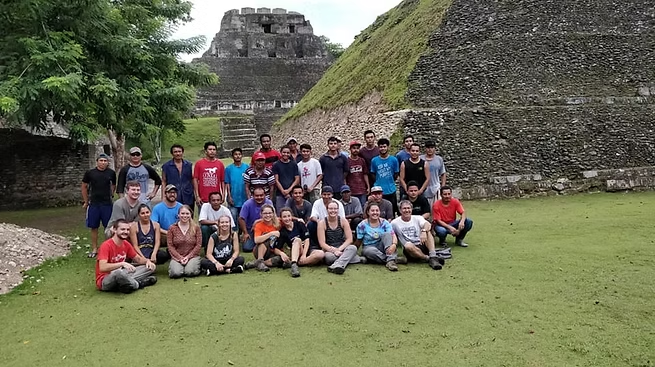Fieldwork Opportunities

During the 2025 field season, our archaeological investigations will concentrate on the ancient Maya sites of Baking Pot and Xunantunich, both located in the upper Belize River Valley near the modern town of San Ignacio, the capital of the Cayo District in western Belize (click here for a location map and general information about Belize). These sites, along with Cahal Pech and Lower Dover, where we have previously conducted fieldwork, represent key centers of ancient Maya political and social life in the region.
Xunantunich and Baking Pot are among the largest and most prominent Classic period (AD 250–900) sites in the upper Belize River Valley. Both served as capitals of medium-sized Maya kingdoms and played significant roles in regional geopolitics and trade. Xunantunich is particularly well known for its impressive hilltop acropolis and monumental architecture, including “El Castillo”, one of the tallest structures in Belize, which offers a commanding view of the surrounding landscape. Recent research at Xunantunich has revealed important insights into elite political strategies, ritual activity, and the site’s relationships with neighboring centers, including Naranjo and Caracol.
At Baking Pot, despite decades of research, substantial areas of the site remain unexplored. In 2025, our work will focus on the Group B palace complex, where we will clear additional sections of the monumental architecture and adjoining courtyards. The goal is to better understand the architectural sequence and determine when and why the royal court ultimately abandoned the palace. These investigations will build on the findings of previous seasons and contribute to a broader understanding of sociopolitical change in the Late and Terminal Classic periods.
The BVAR field school offers participants intensive, hands-on training in archaeological field methods. Over the course of three weeks, students and volunteers receive instruction in survey, excavation, artifact processing, and documentation. The curriculum also includes lectures, site tours, and written assessments, making it ideal for students seeking academic credit or anyone interested in gaining in-depth experience in Maya archaeology. Whether you’re preparing for a career in archaeology or simply passionate about ancient history, the BVAR field school provides a unique opportunity to engage directly with the material past of the ancient Maya world.
Available Sessions:
Session 1: 1 to 21 June, 2025
Session 2: 22 June to 12 July, 2025
Cost: $2300.00 USD per three-week session
Notice: Please read carefully before you consider filling out our application. Thank you for your interest in our project.
All applicants must be at least 18 years old and in good physical health to participate in the program.
Field archaeology is physically, emotionally, and mentally demanding, and it is essential that participants are fully prepared to meet these challenges.
Students may opt to receive academic credit for the program through the Northern Arizona University Center for International Education.
Additional details are provided in the application form.
Registration and Fees: The registration fee includes:
Lodging (weekly, shared accommodations)
Weekday meals
Transportation to and from the airport (on designated arrival/departure days)
Daily transportation to and from the field site
Travel to and from Belize is the responsibility of the participant, along with any incidental expenses. Students must arrive and depart on the specified start and end dates for their session. The project cannot provide airport transportation on other days.
Accreditation: Optional academic credit is available through Northern Arizona University’s Center for International Education. Students wishing to receive credit must make prior arrangements with their home institution’s department and registrar to ensure transferability.
Facilities: Field school fees cover shared lodging and meals in San Ignacio. Participants will stay in shared bedrooms with shared bathrooms. Meals consist primarily of local Belizean fare served at Hode’s Restaurant. Breakfast and dinner are held at the restaurant; lunches are delivered to the field site daily.
Transportation and Travel:
Daily transportation to the archaeological sites is provided.
No work is conducted on weekends, and no transportation is available on Saturdays or Sundays, except for airport transfers on designated days.
At the start of each session, participants will be met at Philip S. W. Goldson International Airport (BZE) in Belize City and shuttled to the project headquarters in San Ignacio (see map here).
Participants may choose to arrange their own travel to San Ignacio, but must arrive before the session begins.
Travel to and from Belize is considered an incidental expense and is not included in the program fee. Optional weekend tours may be organized through local travel agents and guides. Participants are also welcome to arrange personal travel to the coast, or to neighboring Mexico or Guatemala before or after their session.
Field Curriculum: The field school offers a comprehensive blend of formal lectures and hands-on instruction designed to immerse students in archaeological fieldwork and research. Students will be evaluated based on their field notebooks, active participation, and performance on written exams. Daily on-site training covers essential archaeological skills, including site reconnaissance, survey methods, excavation unit set-up, and the mapping of archaeological features in both section and plan view.
In the evenings, lectures will focus on Maya prehistory and highlight current BVAR research themes such as architecture, ceramic analysis, osteology, and hieroglyphic writing. Laboratory sessions provide an introduction to artifact processing, inventory procedures, and preliminary artifact analysis. Depending on interest, additional instruction in artifact illustration may also be available. To support the curriculum, required readings will be assigned, and students are expected to bring their course notebook to the field each day and review the material after work hours.
The annual Belize Archaeology Symposium is held every other year during the break between Sessions I and II (except for 2025. This event offers a valuable opportunity to learn about recent archaeological discoveries and interpretations across Belize. Attendance is optional, and the cost of participation is considered an incidental expense. More details will be shared as they become available.
